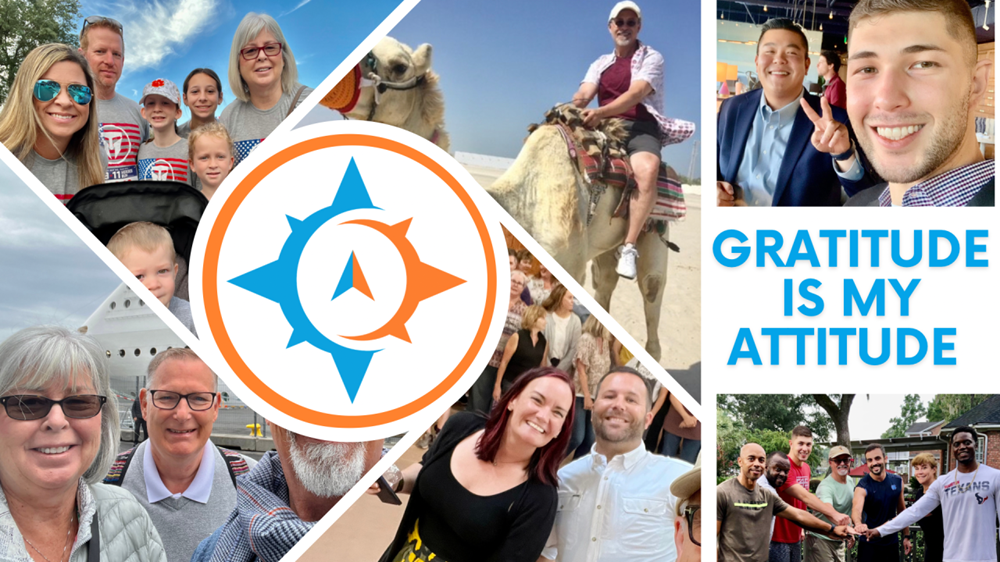
Gratitude is My Attitude
While traveling in Lisbon, Portugal a few years ago, I happened to take a quick photo of my wife standing on a cobble-stone street filled with shops. After posting it on Facebook, I received a comment that the photo looked like a postcard.
That got me to thinking about how grateful I am to have a life filled with many blessings to include my faith, family, fitness, finances, and foundation (giving). Oftentimes, people tell me that I have a large personality and an over-engaged optimistic view of life.
I make no apologies for having either and proudly claim both. That will especially be funny to those who know me well.
For me, I live my life like a postcard and the inscription reads: Gratitude is My Attitude.
It didn't start out that way. Oh no. It took many years of instruction and thoughtful mentorship. My mom, aka FANNY, told me many times that when I was faced with a situation, my choices would define my character. It wasn't the circumstance that would shape my life, but how I handled the situation. Be thankful for what I had and do not spend time worrying about what I was missing.
"Character is defined by choice not circumstance."
If I looked inward, then I might see what I was experiencing as negative, or I could think somewhat selfishly about it.
FANNY coached me during those times when my attitude needed an adjustment to stop and think about the good things in my life. “Look up and thank God for what you have — not what you want. You won't find what you are seeking by looking at the ground.”
Anytime I got into a rut, she would have me take a minute or two and close my eyes, meditate and consider everything I had instead of what I didn't have. FANNY had me write down the good things in my life, then read them out loud. Create a Gratitude Journal.
"Words matter. Choose them wisely."
If I wanted to invent a great future, then speak life to it. If I wanted a positive life, then I needed to speak positive thoughts about it. Avoid limiting my thinking, actions, and language that could rob me of the future I longed for and deserved. That did not mean I could not be sad or disappointed, or hurt and frustrated. What FANNY drove home was not dwelling on the negative aspects outside of my control.
"Gratitude provides perspective."
I got to see living conditions in Thailand, the Philippines, and Africa far worse than anything I'd ever seen or experienced in the United States. The people in those places shared a smile, a prayer, and even what little food they had with me.
After I offered them some supplies we had collected for distribution, they would fall down to the ground, wail tears of gratitude, and thank us over and over and over again.
I do not believe the people I met were resigned to live in those poor conditions, they had their priorities and perspectives right-sized. They placed faith and family first in their life, everything else came third. AND for that, they were thankful.
This was very impactful for me to experience coming from a poor family in a rural area of West Virginia. I grew up in a small town with poor economic conditions, no educational centers (schools or libraries), and was a 30-45 minute drive to the nearest employer or medical facility. Did I have times when I wished I had been born elsewhere? Absolutely. But, I could not allow my thoughts to stop there.
Having an attitude of gratitude opens my mind to the possibility of new opportunities, new dreams, new aspirations, new knowledge, and better outcomes. Practicing gratitude develops a positive outlook and the ability to see beyond the current situation.
Both expressing gratitude and building a positive environment have been important in my leadership. It has set the foundation to exercise transformative thinking and take care of those who counted on me to lead. Grounding myself with a grateful heart helps me express my beliefs freely, have more than enough optimism to share, and create a space where I can put attention and effort on the needs of others before self.
One easy way to practice gratitude is simply saying "Thank you." I read an alarming statistic claiming that a little over 50% of people respond with a "thank you, or thanks" in social settings. Even more disturbing, only 15% of people say "thank you" at work.
In this later phase of life, I have caught myself saying "Thank you so much." Not sure how the habit started, but since I became aware of it, I try to add "so much" whenever possible. It's just one small way for me to express my gratitude and appreciation for what some did for me in a way that conveys they matter.
No one is exempt from problems. The path most traveled is focusing on those issues as problems, a grateful leader transforms the thinking and focuses on the solution of challenging opportunities, not the issue itself.
Once I developed and set into place this gratitude-attitude, then my perspective changed:
- I found there is usually more than one way to look at a challenge, or what others might call a problem. Looking at situations from this vantage point, sets into motion the concept of being open to new ways of doing something, and oftentimes, results in asking others for their input.
- Quite frequently, I realized the problem wasn't as big or complex as once thought. Changing my perspective helped me see details that I originally overlooked. It forced me out of the "Oh, woe is me" thought process. This generally was the result of looking at the issue from a practical perspective and less from an emotional basis.
- I began to value others and found ways to build them up, and say "thank you" more. FANNY told me to thank others for what they do regardless of task, title, or tenure. She drilled into me that if I had to tear someone down to build myself up, then I wasn't that good to begin with. She was right. Today, through my programs to infuse cohesion into cultures, I teach a Cohesion Affirmation to leaders. It is a simple process of affirming other people by recognizing their role, and appreciating them for who they are as a person. A Cohesion Affirmation is another way to say "thank you" to another person on your team, a family member, or a service provider.
- Clarity of the situation was much more in focus. Instead of me over dramatizing a problem or area of concern to gain sympathy, I told myself that the solution to the issue would be within reach. Sharing details about the challenge were aimed at clearly understanding the root cause and gaining the support of others to pitch in and help find some workable solutions.
- My decision-making improved. I sought input from others and allowed their contributions to make a difference. In my bestselling title, "Cohesion Culture: Proven Principles to Retain Your Top Talent" I refer to the process of including your trusted counsel within the concept of "Influence Thinking." When I used trusted sources for information, my ability to make choices happened faster and with greater success.
Maintaining a sense of gratitude aided by a positive approach to life is necessary and part of a continuous process to make life work, regardless of life's messiness or ugliness.
When I look at life through a lens of gratitude, it helps me realize that no matter what happens, I get to choose what type of life I live. It can be filled with apprehension, fear, anxiety, and half-empty glasses, or I can flip it upside down and see possibilities, have confidence, be excited, and realize my glass is neither half-empty nor half-full … it is filled just right.
Thank you for reading my Cohesion Corner™ with Dr. Troy! blog. As a thank you, I would like to offer this free Strengths Self-Assessment downloadable. Complete the worksheet to discover your areas of leadership strength. Click here to download!
For more insight on this topic, please refer to these blog posts:
For leadership principles that can be applied today, click here to subscribe to Cohesion Corner™ with Dr. Troy!
Interested in reading more from Dr. Troy Hall? Check out my books available for purchase on Amazon













